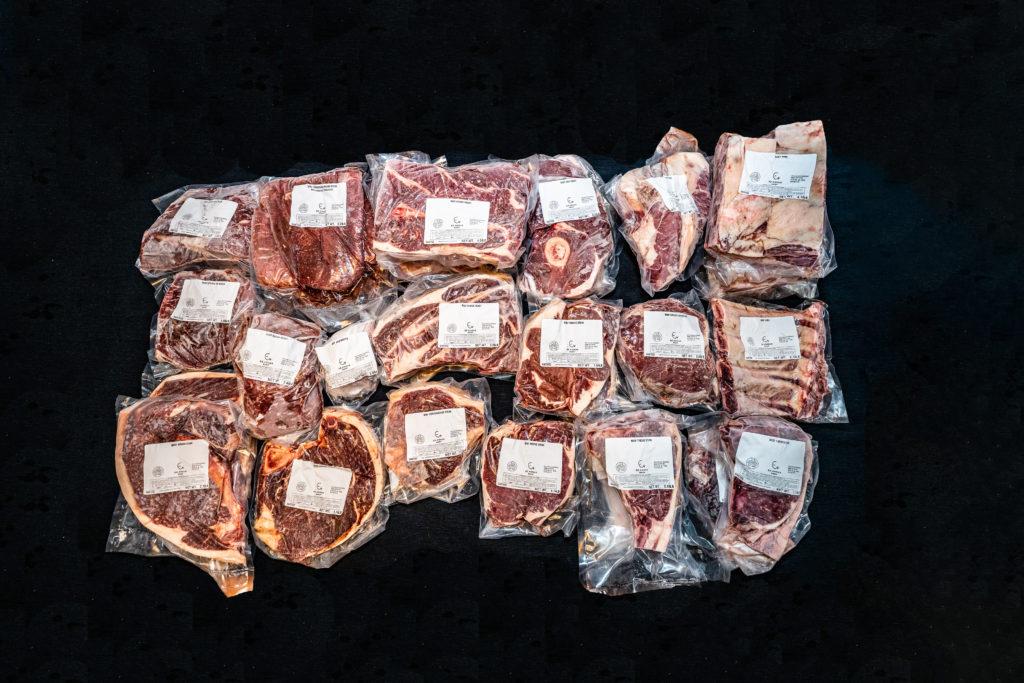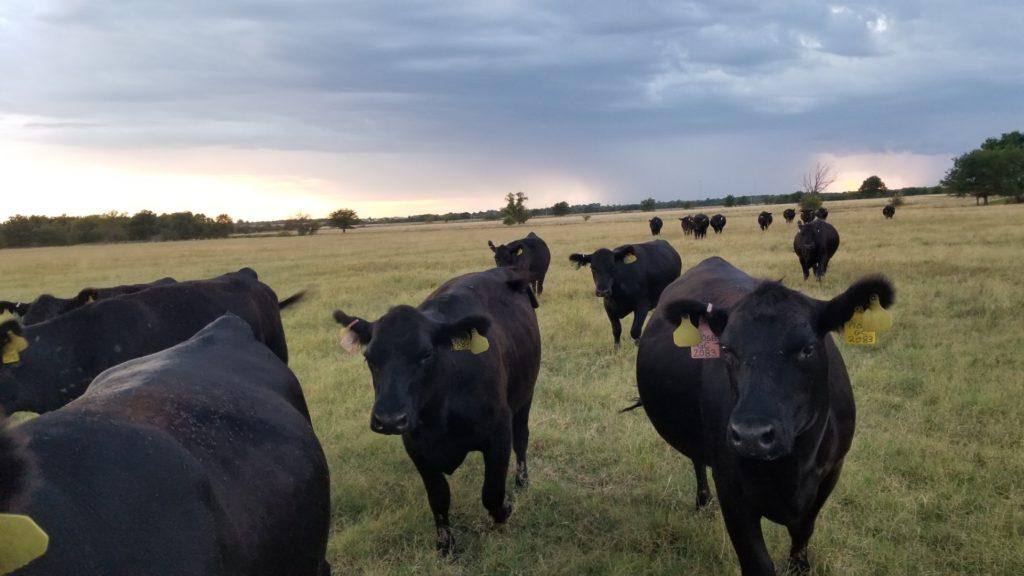Frequently Asked Questions (FAQ)

Is your beef 100% USDA Inspected?
We use local processors that are either state or USDA inspected.
Do I have to pay processing fees?
For standard cuts, the processing fee is already included in the price. There are no processing fees for beef products sold as individually valued packages. See CALL IN for pricing and availability.

Do you use feed based antibiotics on your herd?
EZ Angus does not use feed base antibiotics in our herd.
How do you assure that your cattle are healthy?
Feeding of the cattle and normal, routine ranching activities keep us in daily contact with our cattle. In doing so, we are able to continually monitor for any changes in the condition and health of the animals.

Do you raise your own beef?
YES! For 30+ years we have focused on delivering an excellent eating experience. EZ Angus Beef delivers end products that exceed customer expectations.
Are your cattle grass fed and grass finished, or grass fed and grain finished?
We believe that the ideal way to raise beef is by grass feeding for the entire feeding period. Adding grain in the last few months prior to harvest gives EZ Angus Beef improved marbling that results in tenderness and a delicious flavor!

Are your cattle ever fed any animal by-products?
No, never. We can say with pride that all of our cattle are strict vegetarians.

How are your cattle finished? On Grass or Grain?
All cattle are grass eaters. The actual question should be, “Are your cattle grass-finished or grain-finished? “. EZ Angus cattle have access to grass during the entire feeding period. Grain is added to the cattle’s diet near the end of the feeding period to increase marbling, moisture and flavor for an excellent consumer experience!

What are the nutritional benefits of naturally farmed beef versus commonly available industrial beef from the grocery store?
Naturally farmed beef, also known as grass-fed beef or pasture-raised beef, is raised on a diet of grass and hay, while industrial beef is typically raised on a diet of grain and corn. This difference in diet results in some key nutritional differences between the two types of beef.
- Omega-3 fatty acids: Omega-3 fatty acids are beneficial for heart health and have been linked to a reduced risk of cancer and other diseases. Grass-fed beef contains two to six times more omega-3 fatty acids than grain-fed beef.
- CLA (conjugated linoleic acid): CLA is a fatty acid that has been shown to boost metabolism and reduce body fat. Grass-fed beef contains more CLA than grain-fed beef.
- Vitamins A and E: Vitamins A and E are antioxidants that help protect cells from damage. Grass-fed beef is higher in these vitamins than grain-fed beef.
- Beta-carotene: Beta-carotene is a precursor to vitamin A and has been linked to a reduced risk of cancer. Grass-fed beef is higher in beta-carotene than grain-fed beef.
- Saturated fat: Saturated fat is a type of fat that can raise cholesterol levels and increase the risk of heart disease. Industrial beef contains more saturated fat than grass-fed beef.
- Cholesterol: Cholesterol is a waxy substance that can build up in the arteries and increase the risk of heart disease. Industrial beef contains more cholesterol than grass-fed beef.
- Trans fat: Trans fat is a type of fat that is even worse for heart health than saturated fat. Industrial beef can contain trans fat, while grass-fed beef does not.
In addition to these nutritional differences, naturally farmed beef is also often raised more humanely and sustainably than industrial beef. Grass-fed cows are able to roam freely and graze on grass, which is their natural diet. This allows them to express their natural behaviors and live a healthier life. Additionally, naturally farmed beef production is often better for the environment, as it requires less land and water than industrial beef production.
Overall, there are a number of nutritional and environmental benefits to choosing naturally farmed beef over industrial beef. If you are looking for a healthier and more sustainable choice, then naturally farmed beef is a good option.

How is Beef Graded?
The Grades of Meat in beef are as follows:
- Prime — Highest
- Choice
- Select
- Standard
- Commercial
- Utility
- Cutter
- Canner – Lowest
The more marbling in the meat, the better the grade! Always check to see that the beef is USDA inspected/stamped.
Facts about the Beef Industry
Angus is a breed of cattle that originated in Scotland.
Meat from Angus cattle is noted for its high marbling (white fat flecks within the muscle) which makes the meat tender, moist, and flavorful. The flavor, texture, tenderness, and juiciness of Angus beef all add into making it a quality product and an excellent eating experience!
Fun fact: Angus cattle are “polled” which means they lack horns.
“EZ” is Easy!
As with many things in life, going directly from the supplier to the customer is the straightest and smoothest route for all.
We want to make available the very best quality beef to the every day American dinner table. By skipping the middle man, we are bringing top tier beef at affordable prices through responsible farm to table practices.
Natural Beef is is beef that comes from cattle free from antibiotics, and have been given no artificial ingredients such as growth hormones.
Natural beef meat is processed in such a way that it is minimally altered, giving you not only the best flavor, but also superior nutritional contents.
Fun Fact: All cattle are ruminants and therefore require grass/hay (roughage) as the main part of their diet.
What is the difference between EZ Angus’ Farm-Raised Beef and Grocery Store Meat?
Supermarket meats often contain preservatives and other additives that have been included to increase shelf life of the meat and increase eye appeal. A package of EZ Angus Beef contains one thing – 100% EZ Angus Beef!